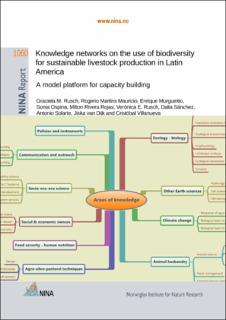| dc.contributor.author | Rusch, Graciela | |
| dc.contributor.author | Mauricio, Rogerio Martins | |
| dc.contributor.author | Murgueitio, Enrique | |
| dc.contributor.author | Ospina, Sonia | |
| dc.contributor.author | Rojas, Milton Rivera | |
| dc.contributor.author | Rusch, Veronica E. | |
| dc.contributor.author | Sánchez, Dalia | |
| dc.contributor.author | Solarte, Antonio | |
| dc.contributor.author | Dijk, Jiska Joanneke van | |
| dc.contributor.author | Villanueva, Cristóbal | |
| dc.coverage.spatial | Latin-Amerika, Mellom-Amerika | nb_NO |
| dc.date.accessioned | 2014-12-02T12:50:58Z | |
| dc.date.accessioned | 2016-08-03T13:02:11Z | |
| dc.date.available | 2014-12-02T12:50:58Z | |
| dc.date.available | 2016-08-03T13:02:11Z | |
| dc.date.issued | 2014 | |
| dc.identifier.citation | Graciela M. Rusch, Rogerio Martins Mauricio, Enrique Murgueitio, Sonia Ospina, Milton Rivera Rojas, Verónica E. Rusch, Dalia Sánchez, Antonio Solarte, Jiska van Dijk and Cristóbal Villanueva, 2014. Knowledge networks on the use of biodiversity for sustainable livestock production systems in Latin America - A model platform for capacity building. – NINA Report 1060. 35 pp. | nb_NO |
| dc.identifier.isbn | 978-82-426-2677-6 | |
| dc.identifier.issn | 1504-3312 | |
| dc.identifier.uri | http://hdl.handle.net/11250/2397713 | |
| dc.description.abstract | Graciela M. Rusch, Rogerio Martins Mauricio, Enrique Murgueitio, Sonia Ospina, Milton Rivera Rojas, Verónica E. Rusch, Dalia Sánchez, Antonio Solarte, Jiska van Dijk and Cristóbal Villanueva, 2014. Knowledge networks on the use of biodiversity for sustainable livestock production systems in Latin America - A model platform for capacity building. – NINA Report 1060. 35 pp.
Knowledge networks are self-organized structures where knowledge generation and exchange take place, thereby providing a basis which capacity building programs can build on by facilitating activities that promote knowledge exchange and mutual learning. The suitability of this kind of network relies on a series of characteristics. First, the transformation required to achieve sustainability in food, feed and fiber production needs to address the socio-ecological complexity of these systems. Lessons learned from experiences in the past indicate that the problems of biodiversity management derive from a mindset that oversimplifies and fragments the understanding of socio-ecological systems. Current views stress the necessity to engage scientists in all relevant fields of biodiversity and ecosystem services science. Knowledge networks can have an important role in bringing together a diversity of knowledge sources.
Second, there is a tight linkage between how food production challenges are solved and the sustainable use and protection of biodiversity, which points to the need of a common understanding of the challenges of protecting biodiversity and ecosystem service among sectors. Knowledge networks organized around the problem of social – economic- and ecological sustainability of food production can play an important role in bridging the communication gap between decision makers addressing environmental, food production and development challenges.
Third, the challenges about biodiversity and ecosystem services need to be undertaken at the regional, national and local levels. The lack of a sufficient understanding of the local conditions, of the challenges and of appropriate solutions that are in agreement with the local needs, are severe hindrances to successful bilateral aid programs. To be successful, future capacity-building endeavours need to address the local realities of both knowledge providers and requesters, and the local capacities to produce and use knowledge. Regional knowledge networks sharing common challenges have the potential to foster knowledge exchange and mutual learning with a focus on locally relevant issues.
The network mapping in this report reveals a large number of knowledge provider organizations that deal with silvopastoral systems as an instrument towards social, economic and environmental sustainability in the livestock production sector in Latin America. National and regional projects and international programs have supported coordination and joint implementation activities that have fostered the organization of local and regional networks but, still, the knowledge is perceived as fragmented and knowledge holders are largely isolated. There seems to be a huge potential to foster capacity building through activities that promote knowledge exchange and mutual learning. The mapping exercise also reveals many knowledge requesters, particularly from governmental organizations at the national level, and some at the international level. However, there appears to be an underrepresentation of knowledge requesters operating at the local level, such as professionals that conduct out-reach activities, civil organizations (such as farmers organizations) and the private sector. There seems to be a perception of academic organizations as knowledge providers but not as knowledge requesters, despite dealing with issues of applied research. | nb_NO |
| dc.language.iso | eng | nb_NO |
| dc.publisher | Norsk institutt for naturforskning | nb_NO |
| dc.relation.ispartofseries | NINA Rapport;1060 | |
| dc.relation.uri | http://www.nina.no/archive/nina/PppBasePdf/rapport/2014/1060.pdf | |
| dc.subject | NINA Rapport | nb_NO |
| dc.subject | Latin America | nb_NO |
| dc.subject | agro-pastoral ecological systems | nb_NO |
| dc.subject | ecosystem services | nb_NO |
| dc.subject | biodiversity | nb_NO |
| dc.subject | Latin-Amerika | nb_NO |
| dc.subject | agro-økonomiske systemer | nb_NO |
| dc.subject | økosystemtjenester | nb_NO |
| dc.subject | biologisk mangfold | nb_NO |
| dc.title | Knowledge networks on the use of biodiversity for sustainable livestock production systems in Latin America. A model platform for capacity building | nb_NO |
| dc.type | Research report | nb_NO |
| dc.date.updated | 2014-12-02T12:50:58Z | |
| dc.source.pagenumber | 35 s. | nb_NO |
| dc.identifier.cristin | 1146833 | |
| dc.relation.project | Miljødirektoratet | nb_NO |
| dc.description.localcode | © Norsk institutt for naturforskning. Publikasjonen kan siteres fritt med kildeangivelse. | nb_NO |
